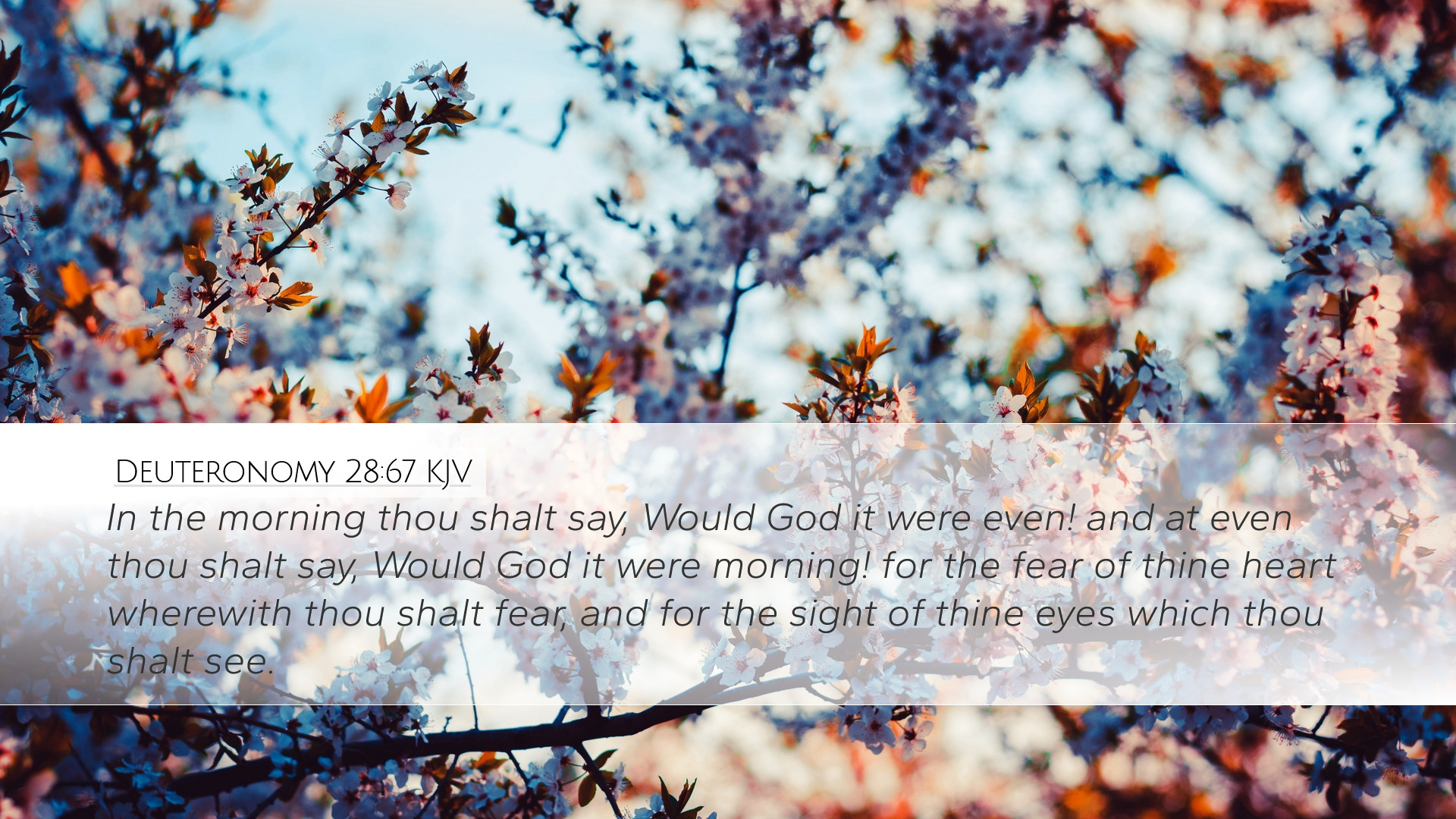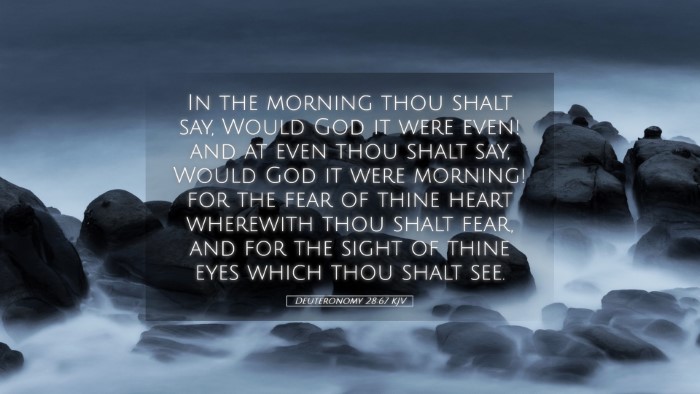Commentary on Deuteronomy 28:67
Verse Text: "In the morning thou shalt say, Would God it were even! And at even thou shalt say, Would God it were morning! For the fear of thine heart wherewith thou shalt fear, and for the sight of thine eyes which thou shalt see."
Overview
This verse is part of the culmination of Moses' instructions to the Israelites regarding the blessings of obedience and the curses resulting from disobedience. Deuteronomy 28 spells out the grave consequences of straying from God’s covenant. This particular verse highlights the emotional turmoil and anguish that will ensue from disobedience, a theme that resonates deeply within the scriptural narrative.
Insights from Public Domain Commentaries
Matthew Henry's Commentary
Henry reflects on the despair expressed in this verse, indicating that the statement entries highlight the inner conflict faced by the disobedient. The longing for the future—whether for morning or evening—emphasizes a profound dissatisfaction with the present conditions. Henry calls attention to the psychological distress that accompanies disobedience, suggesting that the emotional experience of the people is akin to that of Job's lament.
He notes that this illustrates the futility of seeking comfort or relief in an unfaithful lifestyle. As the people would wish for the comfort of evening at the morning and vice versa, they are haunted by their circumstances continually, showing how blessedness is lost through departure from God’s commandments.
Albert Barnes' Notes
Barnes elaborates on the duality of the human experience in relation to time as presented in this verse. He points out that the daily cycle becomes a source of agony rather than relief. The verse signifies that every part of the day brings its own measure of fear and sorrow, suggesting a complete loss of peace.
He asserts that the “fear of thine heart” is a vivid reminder of the internal strife that one experiences. When living under the shadow of God’s judgment, every time of day becomes an opportunity for regret and lamentation. This commentary serves as a cautionary note, encouraging readers to remain steadfast in their faith to avoid such profound distress.
Adam Clarke’s Commentary
Clarke emphasizes the cyclical nature of despair described in this passage, articulating that the Israelites' future experiences of longing stem from their disobedience to God. His interpretation underscores that the heart's fear would create a sense of unending dissatisfaction and anxiety.
Clarke also highlights that the focus on what one wishes for—whether morning or evening—illustrates a deep-seated longing for escape from anguish. Such is the condition of those who stray from divine guidance; they find themselves in a continual cycle of yearning for peace through time, yet remain trapped in their suffering due to their actions.
Theological Implications
The verse encapsulates a significant theological principle of the consequences of sin. The emotional distress of the Israelites is reflective of the broader principle that disobedience leads to separation from God’s blessings, causing unrest and turmoil in one’s life. This not only serves as a warning but also as an avenue for reflection on the need for repentance and restoration.
Practical Applications
- For Pastors: This verse can be a poignant reminder of the importance of leading congregations towards faithfulness, ensuring they understand the seriousness of their choices and the resulting impact on their spiritual well-being.
- For Students: Engage in exploring the emotional dimensions of faith through this passage. Analyze how scripture depicts the human experience of time in relation to spiritual conditions.
- For Theologians: This verse opens up discussions on the nature of divine judgment and mercy. It raises questions regarding the relationship between human actions and their spiritual repercussions.
- For Bible Scholars: This text invites a deeper examination of Hebrew literary structures and the prophetic importance of lamentation in scripture.
Conclusion
Deuteronomy 28:67 serves as a fitting reminder of the emotional weight of spiritual disobedience and its consequences. Drawing from the insights of esteemed commentators, we find a multifaceted understanding of human despair in relation to divine expectation. As we delve into the complexities of this text, may we be challenged to reflect on our lives and remain steadfast in our commitment to the covenant relationship with God.


